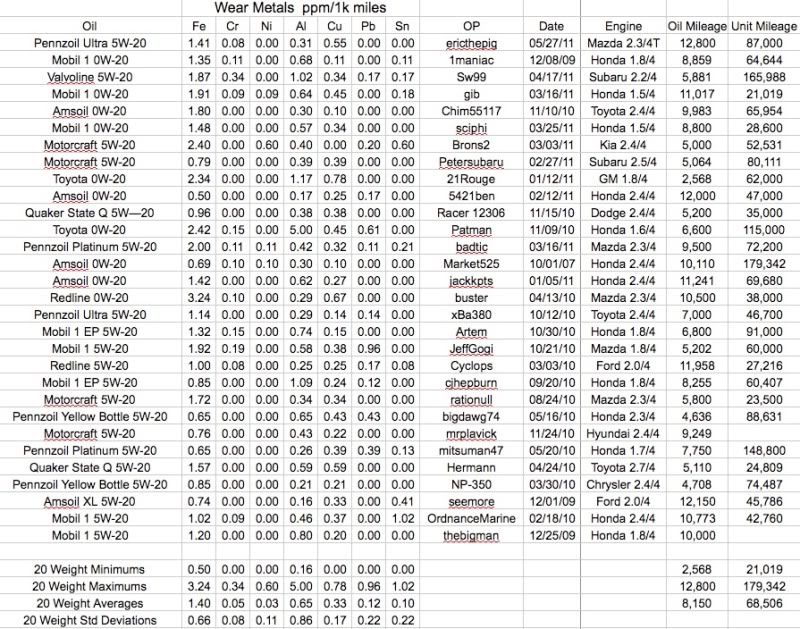I decided to expand my analysis of wear levels demonstrated by 30 weight vs 20 weight oils in an attempt to gain greater analytical rigor.
It seems inappropriate to lump 4, 6, and 8 cylinder engines in the same analysis. So I will be reporting on each of these engine classes separately.
Additionally:
- There is only one reported sample for an OP/engine/oil combination
- Samples that had mixed weights or had additives were not considered
- Samples from engines with less than 20,000 total miles were not considered
- Samples that did not have iron as the highest wear metal were not considered
- Samples that had significant fuel or water contamination were not considered
- An attempt was made to select a balanced mix of manufacturers and engines
Here are the results for 4 cylinder engines. 30 weight oils are presented first.

Here is the 20 weight oil data.

With this more extensive, robust analysis, it can be seen that the 20 weight oils show marginally better results for Fe, Cr, Cu, Pb, and Sn. The 30 weight oils show marginally better results for Ni and Al. That being said, neither group of oil samples is statistically different than the other. This casts doubt on the "known" superiority of 30 weight oils, at least with these 4 cylinder engines.
It seems inappropriate to lump 4, 6, and 8 cylinder engines in the same analysis. So I will be reporting on each of these engine classes separately.
Additionally:
- There is only one reported sample for an OP/engine/oil combination
- Samples that had mixed weights or had additives were not considered
- Samples from engines with less than 20,000 total miles were not considered
- Samples that did not have iron as the highest wear metal were not considered
- Samples that had significant fuel or water contamination were not considered
- An attempt was made to select a balanced mix of manufacturers and engines
Here are the results for 4 cylinder engines. 30 weight oils are presented first.

Here is the 20 weight oil data.

With this more extensive, robust analysis, it can be seen that the 20 weight oils show marginally better results for Fe, Cr, Cu, Pb, and Sn. The 30 weight oils show marginally better results for Ni and Al. That being said, neither group of oil samples is statistically different than the other. This casts doubt on the "known" superiority of 30 weight oils, at least with these 4 cylinder engines.


